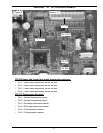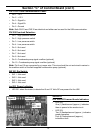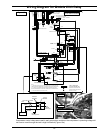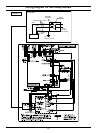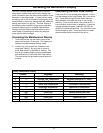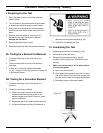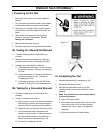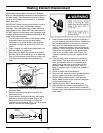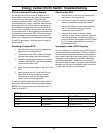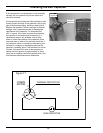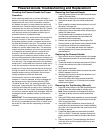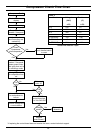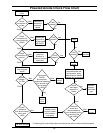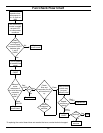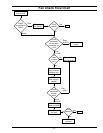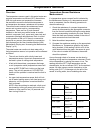
25
Energy Cutout (ECO) Switch Troubleshooting
ECO Function and Troubleshooting:
An energy cutout (ECO) switch is installed on this
water heater to shut down the water heating means
in the event of a malfunction. If the upper tank
temperature reaches 190°F. the ECO contacts will
open breaking the L1 and L2 legs that feed the upper
heating elements. The ECO also interrupts power to
the compressor control relay, which in turn shuts off
power to the compressor. Some models will not have
a compressor relay in which case the compressor will
be controlled directly by the ECO. Refer to the wiring
diagram located on the control box cover to see if a
given unit is equipped with a compressor control relay.
If the ECO has tripped, it must be manually reset as
follows below.
Resetting a tripped ECO:
1. Shut off power to the unit at the breaker/fuse
panel prior to servicing the unit.
2. Gain access to the ECO located in the upper
element compartment, above the element.
3. Check the temperature of the tank. In order to
manually reset the ECO, the tank temperature
must fi rst drop below 120°F.
4. Press the red button located on the front of the
ECO.
5. Apply power to the unit. Once the ECO has
been reset, the fault on the user interface
module should clear and the water heater
should return to normal operation.
If resetting the ECO does not clear the error, the ECO
will need to be checked. Follow the procedure below.
NOTE: Tank temperature must be less than 120°F in
order to re-set ECO.
TABLE 3
Relay Number Load Check Pins
RY 203 Upper Element COM to NO (Top of Relay)
RY 205 Lower Element CN206 pin 1 to 4
RY 207 Compressor CN202 pin 1 to 2
Checking the ECO:
1. Shut off power to the unit at the breaker/fuse
panel prior to servicing the unit.
2. Gain access to the ECO located in the upper
element compartmant, above the element.
3. Remove the black wire from terminal number
one (1) and the white wire from terminal
number three (3) on the ECO.
4. Using an Ohm meter or continuity tester,
check pin 1 to pin 2; there should be continuity
(very low resistance). If resistance is high or
continuity checks bad, replace the ECO. Check
pin 3 to 4, again there should be continuity. If
not replace the ECO.
Investigate cause of ECO tripping:
It is very important to investigate why the ECO tripped
as the control board may be faulty. Check the relays on
the control board to determine if the contacts might be
stuck closed; check the three relays listed in Table 3 by
checking pin to pin resistances as noted. Resistance
should be greater than 1 mega-Ohm (no continuity)
between the pins as listed in the table. If the resistance
between any of the pin combinations listed is less than
1 mega-Ohm, replace the control board.



